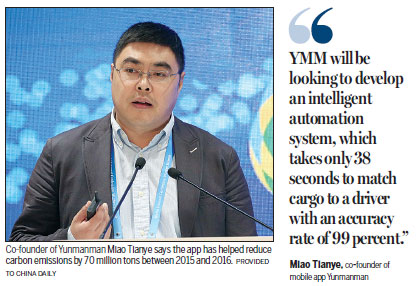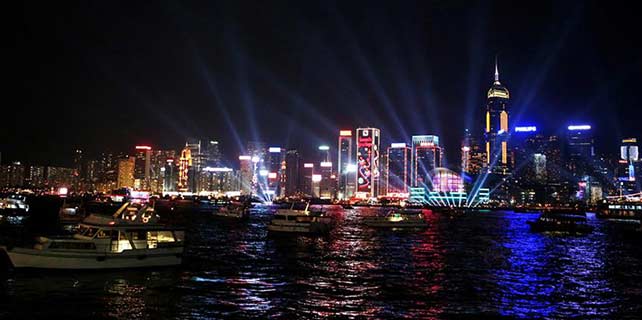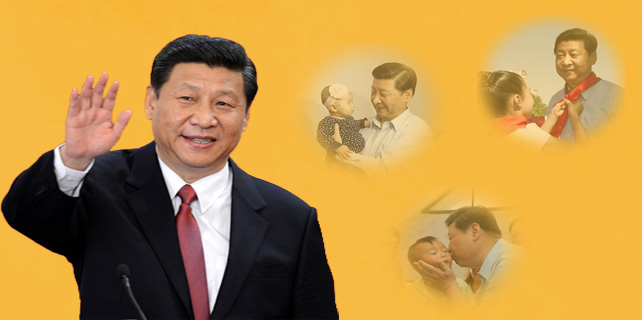A new transportation ballgame

Mobile app Yunmanman is looking to shake up the logistics sector in China by becoming the Uber for cargo companies
In just three years, mobile app Yunmanman (YMM) by Jiangsu Manyun Software Technology Co Ltd has redefined the land-based logistics scene in China, having connected businesses requiring cargo delivery with 78 percent of the nation's heavy truck drivers in more than 350 cities.
Founded in 2013 by Miao Tianye and around 10 partners, the app has reduced average waiting times for cargo drivers from 2.27 days to 0.38 days and facilitates about 240,000 transport deals every day.
Miao, who is the president of Manyun Software Technology, said that the app has also helped reduce carbon emissions by 70 million tons and gasoline expenses by 130 billion yuan ($18.97 billion) between 2015 and 2016.
"As a group of people without any logistics background, we were drawn to the off-line road transportation sector because it can generate several trillion yuan in revenue simply through face-to-face trades," said Miao, who had formerly worked at Chinese e-commerce giant Alibaba for eight years.
"YMM is quite similar to Alibaba' s e-commerce platform Taobao. Today, we have connected more than 850,000 cargo owners to over 3.9 million heavy truck drivers around China."
Previously, heavy truck drivers waited in industrial parks for assignments which were simply scribbled on a small blackboard. But this was not the only example of inefficiency in the industry - data from China' s Ministry of Commerce showed that there is a 37 percent chance that drivers are travelling with no load, which is a waste of time and fuel.
"In the coming years, YMM will be looking to develop an intelligent automation system, which takes only 38 seconds to match cargo to a driver with an accuracy rate of 99 percent. The system takes 1.2 seconds to determine a price and is 98.4 percent accurate. The system can also help to boost scheduling efficiency to 95 percent and increase the income of drivers by 20 percent," said Miao.
The benefits that YMM provided drivers, however, was not readily accepted. Miao said that the company sent more than 2,000 people to industrial parks around the country to promote the app, only to have many return with bruises inflicted by annoyed drivers who were resistant to change. Some of these marketers even had their phones confiscated.
"Any change to a business model that has been around for decades will be extremely difficult to accept. Besides, truck drivers aren' t exactly the most Internet savvy people," said Miao.
Despite the challenges, the team at YMM soldiered on and eventually grew the business revenue to 450 billion yuan in 2016. The company has a presence in three cities - its headquarters is located in Nanjing, Jiangsu province, while its research and development facility and marketing center are based in Shanghai and Beijing respectively.
Besides connecting drivers with cargo owners, YMM also rolled out a credit system to boost transparency and ensure that both parties honor their contracts. Offenders with low credit ratings are placed on a blacklist who prohibits them from using the app.
"Due to its short development period, the Chinese logistics market has faced problems with either parties honoring contracts. An Internet-based operator can provide the industry with a brand new outlook," Yang Haofeng, a logistics insider was quoted as saying by 21 Century Business Herald.
Another problem in the industry is the high accident rate. According to official statistics, more than one-fifth of the deaths in car accidents are caused by heavy truck drivers. To solve this problem, YMM plans to establish an ecosystem to ensure the safety of drivers and their cargos.
"In the coming three to five years, thousands of rest stops for drivers will be established across the nation. This is the first step in establishing the ecosystem," said Miao.
"Rest stops in the United States offer hot showers, air-conditioning, food, vehicle maintenance and refueling, and this has shown us how we can further develop such places here in China," said Xu Qiang, vice-president of YMM.
The company is already looking ahead and setting its sights on markets beyond China. Miao said YMM is planning to expand into countries and regions related to the Belt and Road Initiative, with new versions of the app set to be launched in Vietnamese, Arabic and Russian.
Dongxing Port, which is located at the border of China and Vietnam and sees about 8,000 vehicles pass through every day, is expected to be the first step in YMM' s globalization plans.
wang_ying@chinadaily.com.cn
















